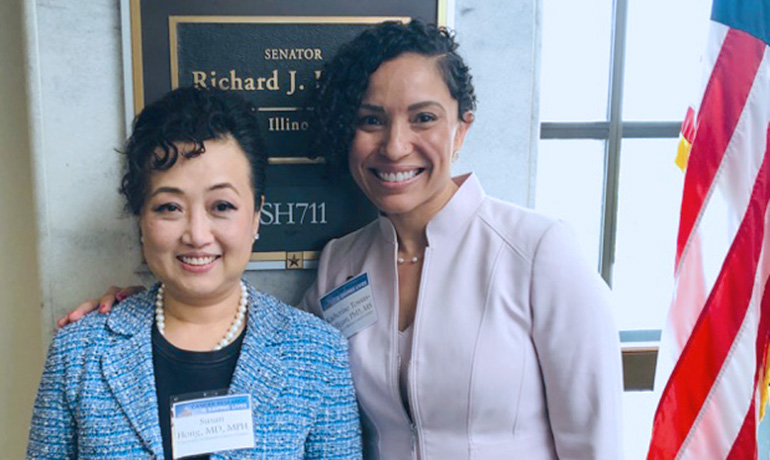
Illinois currently has two National Cancer Institute-designated cancer centers, but the state needs a cancer center in a public institution such as the University of Illinois at Chicago to ensure access to excellent cancer care for all.
That was the message federal lawmakers in Washington heard last week from Kathy Tossas-Milligan, PhD, MS, Office of Global Assets and Innovative Approaches at the UI Cancer Center, and Susan Hong, MD, director of survivorship, during the 2019 Hill Day sponsored by the American Association of Cancer Institutes (AACI) and the American Association for Cancer Research (AACR).
 “Stable, predictable funds are vital to advancing cancer research and care,” said Tossas-Milligan. According to the AACI, with the Trump administration proposing a $4.5 billion cut to National Institutes of Health funding for fiscal year 2020, “there is an even more urgent need for the cancer community to come together. We encourage all members to send at least one representative to Washington to advocate on your center’s behalf.” So the UI Cancer Center did.
“Stable, predictable funds are vital to advancing cancer research and care,” said Tossas-Milligan. According to the AACI, with the Trump administration proposing a $4.5 billion cut to National Institutes of Health funding for fiscal year 2020, “there is an even more urgent need for the cancer community to come together. We encourage all members to send at least one representative to Washington to advocate on your center’s behalf.” So the UI Cancer Center did.
The fiscal year 2019 Department of Defense and Labor, Health and Human Services, and Education Appropriations Act included $5.74 billion for the National Cancer Institute, a $79 million increase over FY 2018. NCI also received $400 million in FY 2019 for the Beau Biden Cancer Moonshot, which was authorized in the 21st Century Cures Act of 2016.
The 21st Century Cures Act authorized $1.8 billion in funding for the Cancer Moonshot initiative over seven years. Prior to FY 2017, with the exception of the funding received through the American Recovery and Reinvestment Act of 2009 (ARRA), the nation’s investment in cancer research experienced a prolonged hiatus in significant financial growth. Despite the opportunity for new funding through Cancer Moonshot, the increased cost of research and the constant dollar loss of funding due to inflation continue to impact the NCI budget and subsequently, the pace of investment in cancer research.
Hong and Tossas-Milligan remained busy throughout the Hill Day, meeting with Illinois representatives Danny Davis, Bobby Rush, Jesus “Chuy” Garcia, Dan Lipinski, Adam Kinzinger and Robin Kelly. They also discussed cancer research funding with Illinois Sens. Tammy Duckworth and Dick Durbin, and had the opportunity to meet U.S. Rep. John Lewis, a famed civil rights leader who is the dean of the Georgia congressional delegation, having served in Georgia’s fifth congressional district since 1987.
 The University of Illinois Cancer Center is seeking to become the third NCI-designated center in the state, Hong told legislators. The more than $42 billion requested for the NIH in FY2020 – with $6.5 billion earmarked for the National Cancer Institute – will “enable continued real growth above inflation for medical research and support promising science in all areas,” she said. NCI designation will bring 10,000 additional jobs to the state and $200 million in additional research dollars, and bring unquantifiable state visibility.
The University of Illinois Cancer Center is seeking to become the third NCI-designated center in the state, Hong told legislators. The more than $42 billion requested for the NIH in FY2020 – with $6.5 billion earmarked for the National Cancer Institute – will “enable continued real growth above inflation for medical research and support promising science in all areas,” she said. NCI designation will bring 10,000 additional jobs to the state and $200 million in additional research dollars, and bring unquantifiable state visibility.
“Illinois has the same population – 12.8 million – as Pennsylvania and they have five NCI designated cancer centers while we have only two,” Tossas-Milligan said. “Illinois has the third highest number of cancer deaths, while Pennsylvania has the fourth highest. Supporting the NIH and NCI budget proposal will bring us closer to our goal of becoming NCI designated and helping individuals from rural and urban underserved communities and racial and ethnic minority backgrounds battle cancer.”
